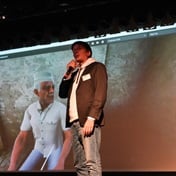In this interview, Arts24 speaks to Dr Uhuru Phalafala, a scholar, artist and lecturer at the University of Stellenbosch. She is currently completing a monograph on Keorapetse Kgositsile titled Black Radical Traditions From the South: Keorapetse Kgositsile and the Black Arts Movement. She heads a project that repatriates and republishes apartheid-era cultural production, which recently republished an anthology of ANC women’s poetry from 1981 titled Malibongwe (uHlanga 2020). Her project Mine Mine Mine is a mythopoetic chronicle of her grandfather’s journey as a migrant worker in the gold mines of Johannesburg.
Arts24: The Malibongwe: Poems from the Struggle by ANC Women collection is being re-issued almost four decades after its initial release. In a way, this is not just a visitation of the archive, it's also corrective historicisation and meaning-making. Having been banned in South Africa, it has existed for some time now as literary mythlore. Can you tell us about how it is you came to be involved in this project and what about it interested you?
Dr Phalafala: I cannot possibly talk about the republication of this book without talking about my training as an academic, as well as my journey as a healer. All my work functions at the intersections of poet-academic-healer. When I was studying South African Literature at a reputable South African university, we were taught that because of exile, and the banning and arrest of political and cultural figures immediately post-Sharpeville, the 1960s came to be known as the "silent decade" of black South African cultural production. As a country, we deferred to the literature of "die sestigers" - white Afrikaans writers such as Andre Brink, Ingrid Jonker, and Breyten Breytenbach - for the production of culture in the 1960s. The 1960s is perhaps the most important decade in the world: the height of the Cold War, the rise of anti-colonial and anti-apartheid resistance, a decade of decolonisation in the Third World.




 Publications
Publications
 Partners
Partners












